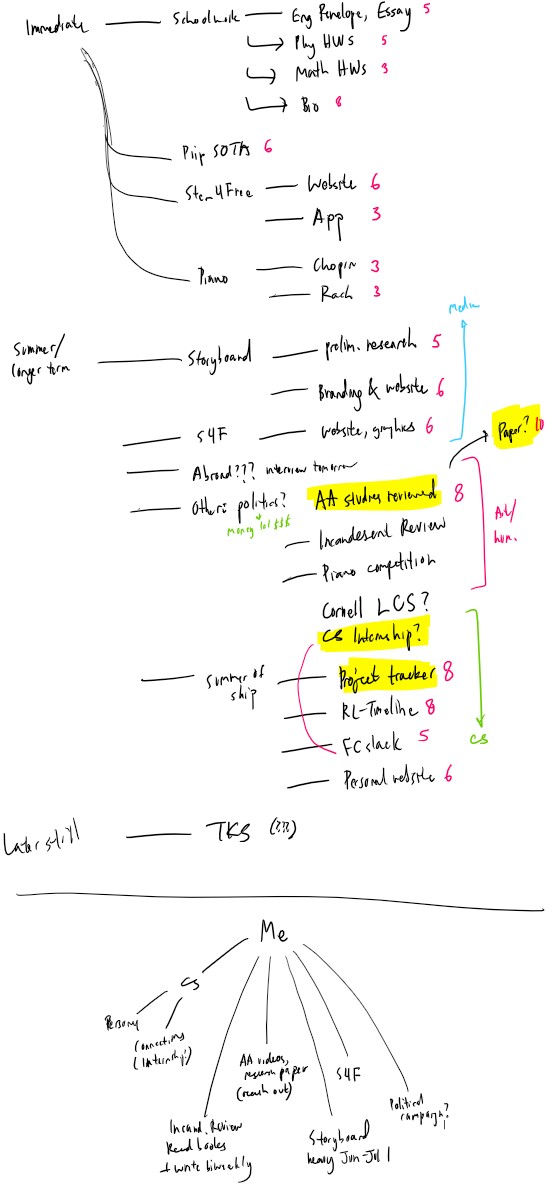The Rule of Three
January 20, 2021
3 min read

"Most people can handle one or two priorities at a time. A TKS kid can handle three," says Nadeem.
TKS elitism aside -- take it as a proxy for basic intentionality -- I find this thought pretty interesting.
My life changed when Boston director Michael Raspuzzi responded to my questions about college and startups with, "what are your top three priorities right now?" Over the course of our half-hour meeting, I came up with my starting three:
- Build breadth and depth of knowledge in ML, quantum computing, and other emerging tech
- Apply to college
- Make an impact at StartupTree, the company I was about to start working at as a PM
Priorities weren't new to me, but having only three was. Over the summer, I drew up a priority list/map that looked like this:

(You can see that I actually ended up highlighting three priorities amidst the mess...)
Having three clear priorites in mind was hugely refreshing. I realized that many of the commitments I had weren't contributing to my goals, and I would be better off dropping them, so I did. The next month, I put a complete pause on my ML learning, swapping it out for a consulting competition that was happening in TKS, able to do everything I tackled fairly well with ample time and energy.
Feeling like I wasn't doing enough in November, though, I stacked opportunities until my commitments blew up in December. I started a series of talks, launched a new app, began a research project, started building the MVP for an old mentor's mental health startup, worked to tackle maternal mortality with EMM and the Nigerian Ministry of Health, and was in the thick of building for StartupTree.
Expectedly, things blew up in my face. I executed on Community Talks well, but everything else slacked. I was barely sleeping and felt like a wreck all the time. Three is the limit, I reminded myself. I aggressively quit jobs and commitments to get back down.
Today, I'm still not at three priorities. I have a research project, Updately, Community Talks, RallyWell, TKS, and personal content creation as buckets. Some things more or less align with each other, like TKS and Community Talks, or (hopefully) RallyWell with content creation. But if I think of them all at the same time, I inevitably feel overwhelmed, and know I'm not executing on these as well as I should.
Recently, though, I feel I've come to a more nuanced understanding of how to effectively handle multiple priorities, and come up with a new rule of three: I can handle thinking about three things per day.
Yesterday, I worked on a big blog post, Updately, and TKS Community Talks, and at the end of the day, I felt really good about what I accomplished! I set clear goals, blocked out clear time intervals, and moved forward happily. As soon as I started to think about a fourth priority, though -- RallyWell or my WPT research -- I started to feel overwhelmed.
Today, my priorities are content creation (published one post already, this is a second), WPT research, and TKS Community Talks. I'm just about through with the first one, and feel I have ample time in the rest of the day for the second and third.
Of course, the actual amount of buckets I think about over the course of a day is more than the three I have planned. Today I have a TKS Accelerate session for which I've blocked out 1.5 hours to read, for example; and I have to cook, handle meetings, etc. But those things aren't really on my mind, someone else is doing the thinking for me. My energy is available to divert elsewhere: this energy allocation is where the three-bucket limit comes into play.
On a similar note, though, it would be better to have even fewer buckets with energy allocated to. Energy will then naturally flow into a third bucket, one that is unexpected and guided by your curiosity and passion rather than conscious thought. For me, this might be making a song cover, or YouTube video, or go for a long run. This natural flow is how you discover new or deeper interests. Analogous to reinforcement learning's exploration-exploitation tradeoff, this natural flow is exploration, while deliberate bucketing is exploitation.
This framework is not very precise. It's not based on anything other than the anecdote of myself and others around me. But the rule of three is a very useful rule of thumb, a pillar that is not entirely stable but provides ample support for sinking in deeper roots of understanding how to manage your time and energy.
Contact me
Have a question about my work? Want to work together? Don't hesitate to reach out!
Email me at hello@samsonzhang.com, or message me on Twitter @wwsalmon.